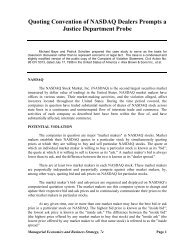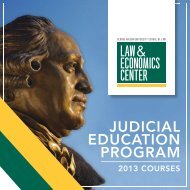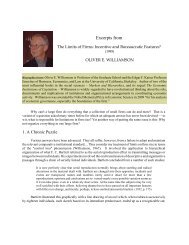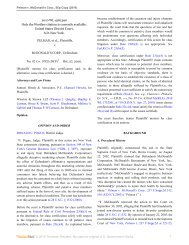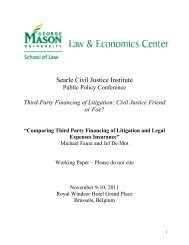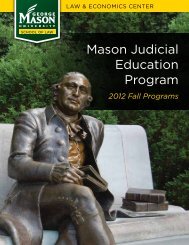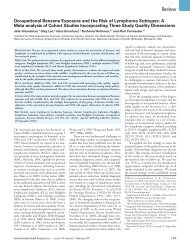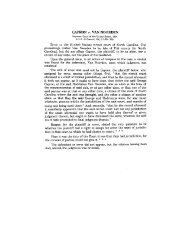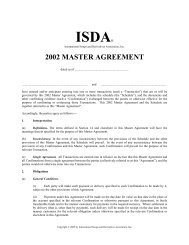Allan G. King, Lisa A. Schreter, and Carole F. Wilder, You Can't Opt ...
Allan G. King, Lisa A. Schreter, and Carole F. Wilder, You Can't Opt ...
Allan G. King, Lisa A. Schreter, and Carole F. Wilder, You Can't Opt ...
- No tags were found...
You also want an ePaper? Increase the reach of your titles
YUMPU automatically turns print PDFs into web optimized ePapers that Google loves.
only to the extent they create an actual conflict with the Rules. 45The Federal Rules themselves provide: “These rules govern the procedure in allcivil actions <strong>and</strong> proceedings in the United States district courts except as stated inRule 81.” 46Rule 81(a)(6) states: “These rules, to the extent applicable, governproceedings under the following laws, except as these laws provide other procedures ...”Rule 81, most recently amended in 2007, identifies seven statutes, including the NationalLabor Relations Act; it does not include the Fair Labor St<strong>and</strong>ards Act. Thus, even in thisspecial category of laws, the Federal Rules are deemed to apply unless the statute inquestion states otherwise.As the Supreme Court explained in Amchem Products, Inc. v. Windsor, theprocedures of the Federal Rules should not lightly be disregarded:Federal Rules take effect after an extensive deliberativeprocess involving many reviewers: a Rules AdvisoryCommittee, public commenters, the Judicial Conference,this Court, the Congress. See 28 U.S.C. §§2073, 2074. Thetext of a rule thus proposed <strong>and</strong> reviewed limits judicialinventiveness. Courts are not free to amend a rule outsidethe process Congress ordered, a process properly tuned tothe instruction that rules of procedure “shall not abridge . . .any substantive right.” 47Similarly, in Hanna v. Plumer the Court observed:the [district] court has been instructed to apply the FederalRule, <strong>and</strong> can refuse to do so only if the AdvisoryCommittee, this Court, <strong>and</strong> Congress erred in their primafacie judgment that the Rule in question transgressesneither the terms of the Enabling Act nor constitutionalrestrictions.” 4845464748Callihan v. Schneider, 178 F.3d 800, 802 (6th Cir. 1999)..Fed. R. Civ. P. 1.Amchem Prods., Inc. v. Windsor, 521 U.S. 591, 620 (1997) (emphasis added).380 U.S. 460, 471 (1965).16




